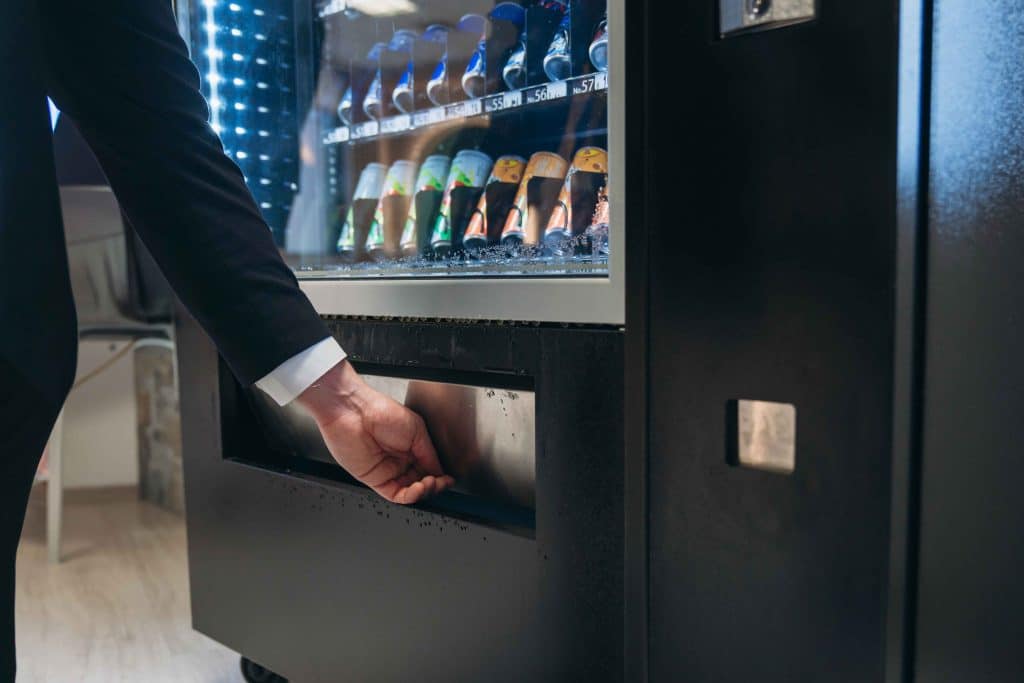In an era where technological advancements are transforming traditional sectors, vending machine technology’s impact on public catering cannot be overlooked. Seamless integration of innovations such as Artificial Intelligence and Internet of Things into vending machines has not only redefined user interaction but also enhanced service efficiency.
This evolution brings to the table intriguing aspects of convenience, hygiene, and sustainability. As we unpack this further, one may find oneself contemplating the potential of technology to reshape the future of public catering.
Get Free Consultation
Key Takeaways
- Vending machine technology, empowered by AI and IoT, is revolutionizing public catering with efficiency and personalized experiences.
- Modern IT solutions in vending machines enhance operational efficiency and customer satisfaction through digital innovation.
- Smart vending in public spaces offers 24/7 availability, data-driven personalization, cost efficiency, and improved hygiene.
- Technological advancements in vending machines are reshaping consumer experience in public spaces with improved accessibility, safety, and engagement.
Introduction to Vending Machine Technology in Public Catering
The evolution of vending machines has significantly transformed public catering, with modern IT solutions playing a critical role. These machines not only streamline service delivery but also enhance customer interaction with the use of IoT and AI technologies. Consequently, this technology enables more personalized, efficient, and hygienic food service options, while delivering operational benefits such as cost reduction and improved inventory management.
Read more about our Smart Vending Solutions!
Overview of Vending Machine Evolution
Evolving significantly over the years, vending machine technology has transformed from basic coin-operated dispensers to sophisticated devices integrated with cutting-edge IT solutions, marking a new era in public catering services.
- Smart Vending Machines: These machines offer personalized experiences, driven by AI integration and digital interfaces.
- Touchless Vending Machines: Leveraging IoT solutions, touchless vending machines offer hygienic, contactless food dispensing, critical in a post-pandemic world.
- Operational Efficiency: Advanced vending machines optimize inventory management and reduce operational costs, driving profitability.
- Future Trends: The technology continues to evolve, with future trends focusing on further enhancing user experience, sustainability, and efficiency in public catering.
This evolution reflects the dynamic nature of vending machine technology and its transformative impact on public catering.
Role of IT in Modern Vending Solutions
As we delve into the role of IT in modern vending solutions, it becomes apparent that digital transformation is revolutionizing public catering, ushering in an era of enhanced convenience, personalization, and efficiency.
IT vending machines, equipped with smart technology, are at the forefront of this change. Smart vending machines, powered by advanced IT solutions, offer the ability to customize product offerings based on user preferences, ensuring a more personalized user experience. Technology vending machines, or tech vending machines, use data analytics to optimize inventory and reduce waste, thereby promoting sustainable practices.
Tech vending machines, with their user-friendly interfaces and efficient service, are transforming public catering, reflecting the power of digital innovation in enhancing customer satisfaction and operational efficiency.

Benefits of Smart Vending in Public Spaces
Integrating smart vending technology into public spaces yields substantial benefits, bringing a fusion of convenience, efficiency, and personalized customer experience to the forefront of public catering.
- Enhanced Convenience: The 24/7 availability of smart vending machines allows consumers to access food and beverages at their convenience, eliminating the limitations of traditional catering services.
- Personalized Experience: These machines use data analysis to tailor their offerings to individual consumer preferences, thus improving customer satisfaction.
- Cost Efficiency: By automating food service, these machines significantly reduce operational costs, contributing to economic sustainability.
- Improved Hygiene: Smart vending machines minimize human contact, thus reducing the risk of contamination and ensuring safer food service.
Technological Innovations in Vending Machines
The evolution of vending machine technology has seen the emergence of advanced features that have revolutionized the public catering sector. The integration of Internet of Things (IoT) has led to the development of smart vending machines, capable of enhancing customer interaction and service delivery. Additionally, the application of AI-driven customization in these machines presents a new frontier of personalized, efficient, and sanitary food service solutions.
Smart Vending Machine Features
Delving into the heart of these transformative changes, smart vending machine features underscore the remarkable strides in technological innovation within the public catering sector. Here are four key features of these state-of-the-art machines:
- Touchscreen Interface: This interactive feature allows users to navigate menus, read product information, and make selections with ease, enhancing the overall user experience.
- Cashless Payments: Smart vending machines support various cashless payment options, including credit/debit cards and mobile payments, providing convenience to users.
- Real-Time Inventory Management: These machines can monitor their own stock levels and automatically generate reports, aiding in efficient inventory management.
- Customized Advertising: They can display targeted ads based on the time of day or buyer’s purchasing habits, creating a more personalized user experience.
Integration with Internet of Things (IoT)
In the realm of technological innovations in vending machines, the Internet of Things (IoT) plays a pivotal role, significantly enhancing their functionality and efficiency. By connecting the vending machines to the internet, IoT integration allows for real-time data collection and monitoring. This enables operators to track inventory levels, machine status, sales trends, and more, all in real-time.
Consequently, it results in improved inventory management, reduced operational costs, and increased profitability. Additionally, it allows for remote troubleshooting, reducing downtime and improving customer satisfaction. Moreover, IoT-enabled vending machines can integrate with mobile payment systems and loyalty programs, offering a seamless and personalized user experience.
Therefore, IoT integration is transforming vending machines into smart, connected, and highly efficient catering solutions.
AI-Driven Customization
Building on the remarkable advantages of IoT, the incorporation of Artificial Intelligence (AI) in vending machines introduces another level of customization that significantly enriches the user experience.
AI technologies enable:
- Predictive Analytics: By analyzing buying patterns, machines can suggest personalized product options, elevating the customer experience.
- Real-Time Inventory Management: Artificial intelligence can monitor stock levels, ensuring optimal product availability and reducing waste.
- Touchless Interactions: AI-powered voice recognition allows for contactless orders, enhancing safety in public catering spaces.
- Dynamic Pricing: AI can adjust prices based on demand and time, promoting efficient consumption and customer satisfaction.
These AI-driven features transform vending machines into smart catering solutions, blending convenience, personalization, and innovation.
Impact on Consumer Experience
The transformation of public catering through vending machine technology significantly alters the consumer experience. This shift has led to increased accessibility and convenience, heightened standards of safety and hygiene, as well as an enriched customer engagement and interaction. The following discussion will provide a detailed examination of these impacts on the consumer experience in public catering environments.
Enhanced Accessibility and Convenience
With the advent of advanced vending machine technology, consumers are witnessing unprecedented accessibility and convenience in public catering, revolutionizing their overall dining experience.
- 24/7 availability – Vending machines provide round-the-clock service, accommodating consumers with varying schedules and preferences.
- Reduced Wait Times – The instantaneous nature of vending machines reduces queues and wait times, resulting in a swift and seamless service.
- Wider Variety – With the ability to stock a multitude of products, these machines cater to diverse dietary needs and preferences, enhancing customer satisfaction.
- Ease of Payment – Advanced machines enable effortless digital payments, making transactions smoother and quicker.
These enhancements are elevating the consumer dining experience, making vending machines an increasingly popular choice in public catering.

Safety and Hygiene
Prioritizing safety and hygiene, advanced vending machine technology significantly contributes to a cleaner and more controlled food service environment, enriching the consumer experience. These machines are equipped with features such as automatic sanitization, temperature control, and touchless payment options, minimizing the risk of contamination.
| Feature | Impact |
| Automatic Sanitization | Ensures cleanliness and reduces the risk of bacterial and viral spread. |
| Temperature Control | Maintains freshness and prevents food spoilage. |
| Touchless Payment | Eliminates the need for physical contact, minimizing transmission risks. |
| Pre-packaged Food | Enhances hygiene by limiting direct human handling. |
| Regular Maintenance | Ensures optimal functioning and cleanliness of machines. |
These features not only ensure safety and hygiene but also foster consumer confidence, driving a positive shift in public catering experiences.
Customer Engagement and Interaction
Beyond ensuring safety and hygiene, advanced vending machine technology significantly reshapes customer engagement and interaction, leading to a marked enhancement in consumer experience.
- Improved Convenience: Smart vending machines offer 24/7 availability, reducing wait times and increasing customer satisfaction.
- Personalization: AI-driven technology enables personalized recommendations based on consumer purchase history, enhancing the user experience.
- Interactive User Interface: Touch-screen interfaces and digital payment options make the purchase process more interactive and user-friendly.
- Increased Trust: Clear display of nutritional information and real-time updates on product availability builds consumer trust and loyalty.
These developments not only revolutionize the way consumers interact with vending machines but also set new standards for public catering services.
Operational Advantages for Catering Services
As we transition into discussing operational advantages for catering services, it is essential to consider the significant benefits vending machine technology provides. Factors such as cost efficiency and reduced overhead, inventory and supply chain management, and scalability and flexibility are key considerations.
Each of these aspects collectively contributes to optimizing operations, improving service delivery, and enhancing overall business performance in the public catering sector.
Cost Efficiency and Reduced Overhead
In the realm of operational advantages, vending machine technology significantly boosts cost efficiency and reduces overhead for catering services. It achieves this through:
- Lower Labor Costs: Reduced manpower is required as the machines handle transactions, food dispensing, and in some cases, food preparation.
- Reduced Waste: Sophisticated mechanisms ensure optimal food dispensing, minimizing waste.
- Energy Efficiency: Modern machines are designed to consume less energy, decreasing utility costs.
- Increased Sales Hours: Vending machines operate round-the-clock without the need for additional staff, increasing revenue potential.
These factors collectively contribute to a leaner, more efficient operation that not only saves money but also enhances customer satisfaction by delivering fast, convenient service.
Inventory and Supply Chain Management
Another pivotal advantage of incorporating vending machine technology in public catering relates to the substantial improvements in inventory and supply chain management. Vending machines with integrated digital systems facilitate real-time tracking of inventory levels, reducing wastage and ensuring optimal stock availability.
This digitalization also strengthens supply chain efficiency by enabling predictive analytics which can forecast demand and streamline procurement processes. Furthermore, it mitigates the risk of human error, enhancing the accuracy of inventory records.
By automating these crucial operational aspects, public catering services can more effectively manage resources, reduce costs, and improve service delivery. Thus, the integration of vending machine technology represents a significant stride toward operational excellence in the public catering sector.

Scalability and Flexibility
Beyond inventory management, vending machine technology offers remarkable scalability and flexibility, making it a strategic asset for the operational advancement of catering services.
- Scalability: The ability to effortlessly increase or decrease the number of vending machines according to demand facilitates growth and expansion without significant operational disruption.
- Flexibility: Vending machines can offer a variety of food and beverage options, catering to diverse consumer preferences and dietary needs.
- Efficiency: These machines can operate 24/7, providing consistent service at any time, thereby reducing labor costs and increasing service efficiency.
- Adaptability: With advancements in AI and IoT, vending machines can adapt to changing consumer behavior, enabling more personalized and dynamic catering services.
Innovations Shaping the Future of Vending Machines
As we move forward, the future of vending machine technology promises to extend beyond traditional applications, transforming various sectors with innovative solutions. These advancements not only streamline operations but also make strides in promoting environmental sustainability. In the following section, we will discuss the broader applications of vending solutions and their role in advancing green initiatives.
Broader Applications for Vending Solutions
In the realm of public catering, the potential for broader applications of vending machine solutions is steadily being unleashed, driven by a wave of innovative technologies shaping the future of these automated services.
- Personalized Customer Experience: With AI and machine learning, vending machines can now recommend products based on customer preferences, transforming the way people interact with vending solutions.
- Healthcare: Vending machines are being used to dispense prescription medications, providing a quick and convenient solution for patients.
- Retail: From electronics to cosmetics, vending machines are breaking into the retail industry, offering a unique shopping experience.
- Education: Schools and colleges are using vending machines to distribute books and supplies, eliminating the need for long queues and reducing operational costs.
Advancing Green Initiatives
With the escalating global focus on sustainability, vending machine technology is increasingly advancing green initiatives, contributing significantly to the reduction of environmental impact in the public catering sector. Innovations include energy-efficient machines, usage of biodegradable or recyclable materials for packaging, and smart systems that minimize food waste.
Some machines are now solar-powered, further reducing carbon footprint. Technology also aids in reducing waste by accurately managing inventory, preventing overstocking and subsequent disposal of perishables.
Additionally, digital interfaces eliminate the need for paper receipts, further driving sustainability. Hence, these developments illustrate how modern vending machines are not only revolutionizing the convenience of public catering, but also promoting environmental responsibility.
Conclusion
In conclusion, the integration of advanced technologies into vending machines is revolutionizing public catering on an unprecedented scale. These intelligent solutions, merging convenience and sustainability, are redefining the consumer experience while optimizing operational efficiency.
As this technological wave continues to surge, the face of public catering may soon be unrecognizable, completely transformed by the astounding power of vending machine technology. The future indeed looks promisingly delicious for both catering professionals and technology enthusiasts.
Vending Solutions
With our smart vending solutions, grab-and-go shopping gets simpler, faster, and more personalized.
Frequently Asked Questions
How Has the COVID-19 Pandemic Influenced the Adoption of Vending Machine Technology in Public Catering?
The COVID-19 pandemic has propelled the prevalence of vending machine technology in public catering, promoting contactless transactions, personalized service, and efficient food distribution, thereby ensuring safety, sanitation, and seamless service amid social distancing protocols.
What Are Some Potential Challenges or Drawbacks of Implementing Advanced Vending Machine Technology in Public Catering Environments?
Potential challenges of implementing advanced vending machine technology in public catering environments include high initial investment costs, user acceptance, technical issues, and the need for regular maintenance and updates to ensure optimal performance.
Can Vending Machine Technology Be Used Effectively in All Types of Public Catering, or Is It More Suited to Specific Venues or Events?
Vending machine technology can be effectively implemented in various public catering scenarios. However, its suitability may vary, being particularly beneficial in high-traffic venues or events where efficiency and convenience are paramount.
How Does the Use of Vending Machine Technology Align With Global Efforts to Reduce Food Waste and Promote Sustainability?
Smart vending machine technology significantly reduces food waste, aligning with global sustainability efforts. For instance, intelligent inventory management reduces overstocking, and real-time data tracking helps in timely replenishment, minimizing wastage due to spoilage.
Are There Any Notable Case Studies or Examples of Successful Implementation of Vending Machine Technology in Public Catering?
Yes, notable examples include Japan’s widespread use of vending machines for diverse food options and California’s Farmer’s Fridge, which offers fresh salads and snacks through refrigerated vending units, enhancing convenience and reducing food waste.

